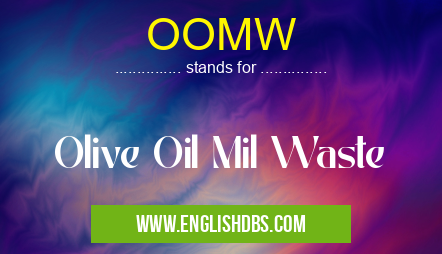What does OOMW mean in UNCLASSIFIED
OOMW refers to the solid and liquid byproducts generated during the extraction of olive oil from olives. It consists of olive stone fragments, skin, pulp, and water. OOMW is a major concern for olive oil producers due to its high organic content and potential for environmental pollution.

OOMW meaning in Unclassified in Miscellaneous
OOMW mostly used in an acronym Unclassified in Category Miscellaneous that means Olive Oil Mil Waste
Shorthand: OOMW,
Full Form: Olive Oil Mil Waste
For more information of "Olive Oil Mil Waste", see the section below.
Essential Questions and Answers on Olive Oil Mil Waste in "MISCELLANEOUS»UNFILED"
What is OOMW (Olive Oil Mill Waste)?
What are the environmental concerns associated with OOMW?
Untreated OOMW can pose significant environmental risks. Its high organic content and acidity can lead to water and soil pollution, disrupting aquatic ecosystems and reducing soil fertility. Additionally, OOMW can release foul odors and harbor pathogens, creating nuisance issues for nearby communities.
How is OOMW typically managed?
Traditional methods of OOMW management include land spreading, composting, and landfilling. However, these practices can be inefficient, costly, and environmentally unsustainable. In recent years, research has focused on developing innovative and environmentally friendly technologies for OOMW valorization.
What are the potential uses of OOMW?
OOMW contains valuable compounds that can be recovered and utilized for various applications. These include:
- Bioenergy: OOMW can be converted into biogas through anaerobic digestion, providing a renewable energy source.
- Animal feed: OOMW can be processed into high-protein animal feed, reducing waste and providing nutritional value.
- Biofertilizers: OOMW can be composted to produce organic fertilizers that improve soil health and crop productivity.
- Biomaterials: OOMW can be used as a raw material for the production of bioplastics and other sustainable materials.
What are the challenges in OOMW valorization?
Challenges in OOMW valorization include:
- High variability: OOMW composition can vary significantly depending on factors such as olive variety, extraction method, and climate.
- Technical limitations: Developing efficient and cost-effective technologies for OOMW processing can be challenging.
- Regulatory barriers: Regulations governing the use of OOMW-derived products can vary across regions, hindering commercialization.
What is the future of OOMW management?
The future of OOMW management lies in the development and implementation of sustainable and value-added solutions. Research and innovation will play a crucial role in optimizing OOMW valorization and minimizing its environmental impact. Collaboration between researchers, industry, and policymakers is essential to create a circular economy for OOMW, maximizing its potential while addressing its challenges.
